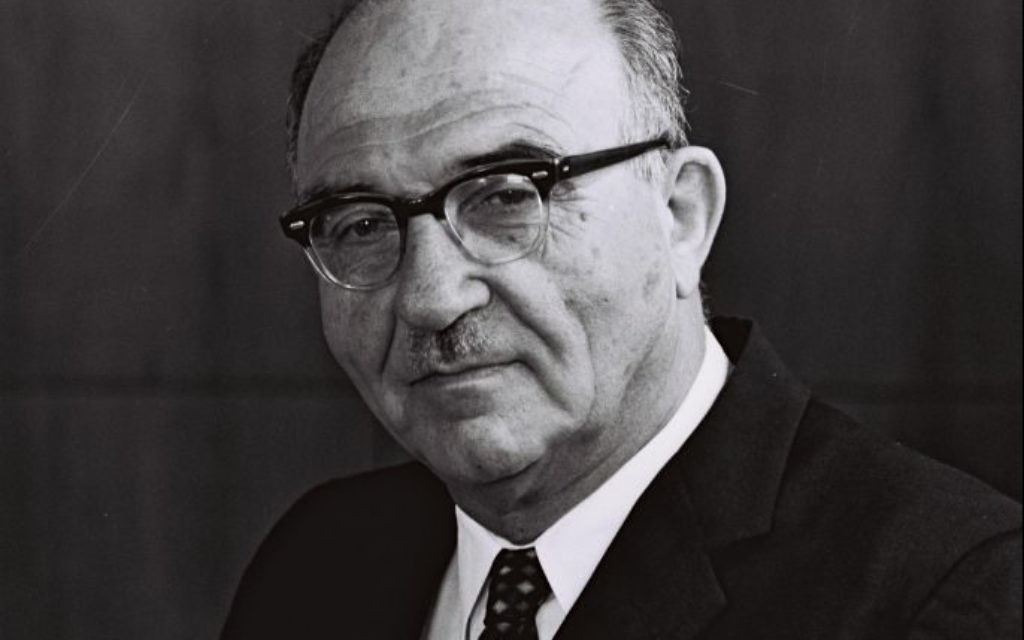Oft-Forgotten Israeli Pioneer Levi Eshkol
Early in his life, Levi Eshkol earned a reputation as a hard worker who combined physical labor with a knack for economics.

On Oct. 25, 1895, 120 years ago this week, Levi Shkolnik was born near Kiev. After finishing high school in Vilna, he made aliyah at age 19.
Upon arriving in the land of Israel, Levi lived in a variety of agricultural settlements, working as a pipe layer and picking olives and grapes. As a result of his work in the vineyard, he chose a new, Hebrew last name, Eshkol, meaning “cluster of grapes.”
According to his daughter, he declined his parents’ offer of financial help for aliyah, answering, “Only if I come empty-handed will these hands be ready to work.”
Get The AJT Newsletter by email and never miss our top stories Free Sign Up
Eshkol earned a reputation as a hard worker who combined physical labor with a knack for economics. According to a biographer, in these early years in the land of Israel he was referred to as a macher, Yiddish for a doer.
During World War I, Eshkol served in the Jewish Legion and soon after was involved in establishing agricultural settlements throughout the land of Israel. His gift for organization and finance shaped his contributions to Israel’s development. In the 1920s and 1930s, he became a leader in the Histadrut, the Jewish labor union, and was among the founders of the Mapai Party.
While best known for being Israel’s prime minister during the June 1967 Six-Day War, the 50th anniversary of which has been commemorated this year, Eshkol played a major role in Israel’s state-building and political culture. Three examples that highlight his importance to Israel and are often overlooked are presented below.
In 1937, recognizing the need for greater independence in providing water resources to Jewish communities, Eshkol coordinated the creation of Mekorot (sources). Under Eshkol’s direction, the new water corporation planned and fulfilled the water supply needs of the Yishuv.
One of Eshkol’s great contributions was to devise projects whereby water was brought from its sources to areas where it was not as plentiful. This was achieved using a variety of measures, including reservoirs, pipelines and diversion projects directed by Eshkol.
In 1963, after he became Israel’s third prime minister as well as its defense minister, one of Eshkol’s first priorities was to modernize the Israel Defense Forces with new weapons, especially aircraft, tanks and naval vessels.
After becoming the first Israeli prime minister to be invited for an official state visit to Washington, he developed a strong relationship with President Lyndon Johnson. This connection led to advanced weapons purchases from America in 1965.
Finally, Eshkol played a prominent role in moving Israel forward domestically and politically.
In 1966, he ended the military administration of Israel’s Arab citizens, which had restricted their movement, imposed curfews and enacted other restrictions.
Politically, in 1964, he agreed to the re-interment of Ze’ev Jabotinsky, the founder of Revisionist Zionism and the spiritual father of the Israeli right, on Mount Herzl in Jerusalem.
In the days leading to the June 1967 war, he created Israel’s first national unity government, bringing on opposition leader Menachem Begin as a minister without portfolio.
In 2016, President Reuven Rivlin said Eshkol’s decision “gave legitimacy to Herut (the precursor to Likud) when he established a national unity government. … He understood the true meaning of democracy when he made Menachem Begin a minister in his government.”
For many, the lasting legacy of Eshkol was his stuttering radio address on May 28, 1967, which caused anxiety among the Israeli public in the face of an impending war, but Eshkol’s contributions to Israel were impressive.
His former speechwriter Avraham Avi-Hai said: “Levi Eshkol was the land-builder and people-builder. No single Israeli had more to do with every aspect of creating a viable country, people and economy than this seemingly buff Ukrainian-born pioneer. His Atlas-like strength and his broad shoulders carried a penniless new state, licking wounds of war and the loss of 10,000 women, men and children.”




comments